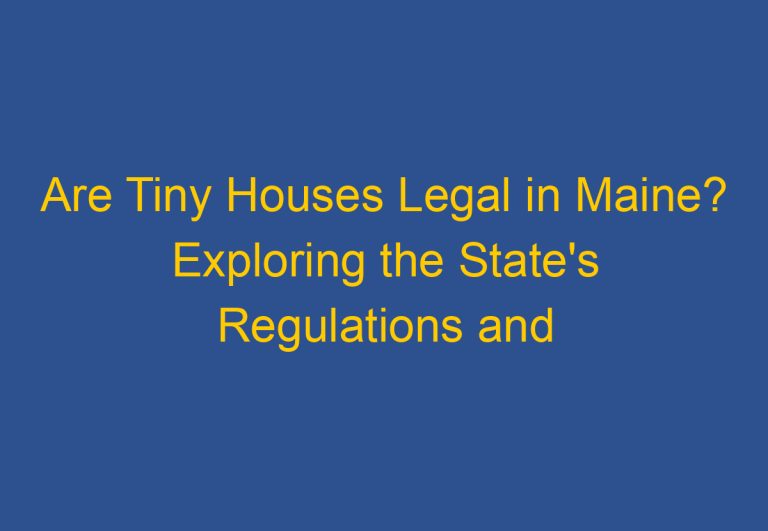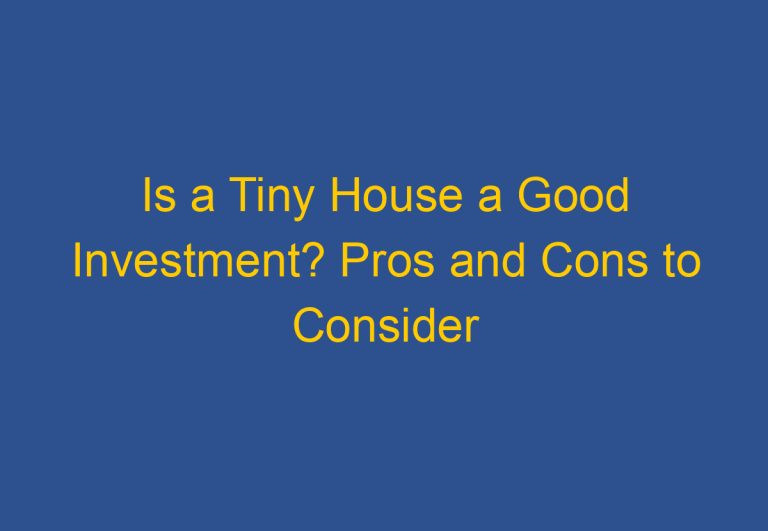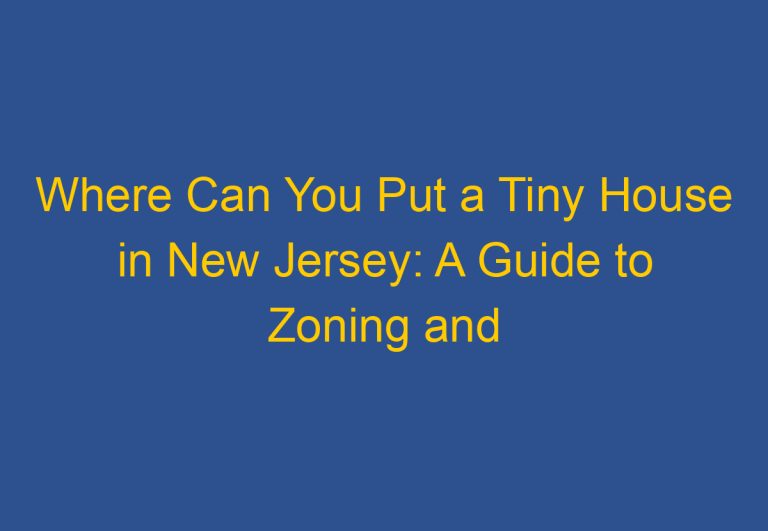Which Counties in Georgia Allow Tiny Houses: A Comprehensive Guide
Tiny houses are becoming increasingly popular in the United States, and Georgia is no exception. However, not all counties in the state allow the construction or placement of tiny houses. It can be challenging to navigate the legal and regulatory landscape surrounding tiny houses in Georgia, but with the right information, it is possible to find the right county for your tiny house.

Several counties in Georgia permit the construction and placement of tiny houses. According to the search results, some of these counties include Fulton, DeKalb, Barrow, Gwinnett, and Cherokee. However, it is essential to note that each county may have its own set of regulations and restrictions on the size, location, and use of the tiny house. For example, Fulton County requires that a tiny house be at least 400 square feet and have a permanent foundation.
If you are considering building or placing a tiny house in Georgia, it is crucial to do your research and understand the regulations in your chosen county. This article will provide a comprehensive guide to the counties in Georgia that allow tiny houses, as well as the legal and regulatory considerations that come with tiny house living.
Legality and Zoning Regulations

When it comes to tiny house regulations in Georgia, it’s important to understand the local zoning laws and building codes. Zoning laws and regulations vary from place to place, and not all communities are welcoming of tiny houses. However, there are several counties in Georgia that allow tiny homes, and each county may have its own set of regulations.
Understanding Local Zoning Laws
Zoning laws dictate how land can be used and developed in a particular area. In Georgia, local zoning ordinances determine whether tiny houses are legal in a specific region. Some cities and counties have specific rules and regulations that govern the placement and construction of tiny houses. It is important to check with local authorities before starting any tiny house project.
Counties with Favorable Tiny House Regulations
According to the search results, several counties in Georgia allow tiny houses, including Fulton, Dekalb, Cherokee, Carroll, Butts, and Banks County. However, only three of the six counties in Banks County permit the construction of small dwelling units. Banks, Butts, and Hart counties are some of these counties. You will require a construction permit to build a tiny house in Banks or Butts County. The Banks County Zoning Department is responsible for issuing the permission.
Building Codes and Safety Standards
Building codes in Georgia are based on the International Residential Code (IRC). The IRC provides a set of standards for the construction of residential buildings, including tiny houses. It is essential to follow these codes and safety standards to ensure that the tiny house is safe and structurally sound.
In conclusion, while not all Georgia communities are welcoming of tiny houses, there are several counties in the state that permit their construction. Before starting any tiny house project, it is essential to understand the local zoning laws, building codes, and safety standards. By doing so, you can ensure that your tiny house is legal, safe, and structurally sound.
Practical Considerations for Tiny House Living

Site Planning and Utilities
Before building or placing a tiny house, it is essential to consider the site and utilities. The site should be level, stable, and well-drained. The tiny house must have access to utilities such as electricity, water, and sewage. The utilities should be installed by licensed contractors and comply with local codes and regulations. It is also essential to plan for the placement of the tiny house on the site to maximize natural light, airflow, and privacy.
Construction and Permitting Process
The construction and permitting process for a tiny house can vary depending on the location and the type of tiny house. In Georgia, the International Residential Code (IRC) sets the standards for safety and habitability for tiny houses. Additionally, each county may have its own set of regulations and restrictions on the size, location, and use of the tiny house. It is essential to obtain the necessary building permits and construction permits before starting the construction process.
Lifestyle and Community Aspects
Tiny house living is a minimalist lifestyle that requires downsizing and simplifying one’s possessions and lifestyle. It is essential to consider the amenities and community aspects of the location where the tiny house will be placed. RV parks and campgrounds are popular options for tiny house living. However, it is crucial to research and ensure that the location complies with local laws and regulations. Additionally, it is essential to consider insurance and property taxes for the tiny house.
Overall, tiny house living can be an affordable housing option and a way to embrace a minimalist lifestyle. With proper planning and consideration of the practical, legal, and lifestyle aspects, tiny house living can be a fulfilling and rewarding experience.
Frequently Asked Questions

What are the zoning regulations for tiny houses in Georgia?
Zoning regulations for tiny houses in Georgia vary by county. Some counties have specific regulations, while others do not. It is important to research the zoning regulations for the county in which you plan to place your tiny house. Generally, tiny houses must meet certain safety and habitability standards and be licensed and insured as a dwelling unit.
Is there a minimum square footage requirement for homes in Georgia?
Georgia has a minimum square footage requirement of 400 square feet for homes. However, this requirement does not apply to tiny houses. Tiny houses are typically defined as homes that are 400 square feet or less, excluding lofts.
How do I obtain a permit for a tiny house in Georgia?
To obtain a permit for a tiny house in Georgia, you will need to contact the zoning department in the county where you plan to place your tiny house. Each county has its own set of regulations and requirements for obtaining a permit. You may need to provide detailed plans and specifications for your tiny house to obtain a permit.
Can I legally place a tiny house on my property in Georgia?
In Georgia, you can legally place a tiny house on your property as long as it meets the zoning regulations for your county. Some counties may require that your tiny house be placed on a foundation, while others may allow it to be on wheels. It is important to research the zoning regulations for your county before placing a tiny house on your property.
What is the cost range for building a tiny house in Georgia?
The cost range for building a tiny house in Georgia varies depending on the size, materials used, and other factors. On average, a DIY tiny house can cost anywhere from $10,000 to $30,000, while a professionally built tiny house can cost upwards of $50,000. It is important to carefully consider your budget and research the cost of materials and labor before building a tiny house.
Where in Georgia is it most affordable to situate a tiny house?
The affordability of siting a tiny house in Georgia depends on various factors, including land prices, zoning regulations, and access to resources and amenities. Some counties may be more affordable than others. It is important to research the cost of land and other factors in the county where you plan to place your tiny house.






